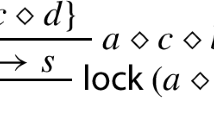Abstract
In this paper we study the application of the Minimum Description Length principle (or two-part-code optimization) to grammar induction in the light of recent developments in Kolmogorov complexity theory. We focus on issues that are important for construction of effective compression algorithms. We define an independent measure for the quality of a theory given a data set: the randomness deficiency. This is a measure of how typical the data set is for the theory. It can not be computed, but it can in many relevant cases be approximated. An optimal theory has minimal randomness deficiency. Using results from [4] and [2] we show that:
– Shorter code not necessarily leads to better theories. We prove that, in DFA induction, already as a result of a single deterministic merge of two nodes, divergence of randomness deficiency and MDL code can occur.
– Contrary to what is suggested by the results of [6] there is no fundamental difference between positive and negative data from an MDL perspective.
– MDL is extremely sensitive to the correct calculation of code length: model code and data-to-model code.
These results show why the applications of MDL to grammar induction so far have been disappointing. We show how the theoretical results can be deployed to create an effective algorithm for DFA induction. However, we believe that, since MDL is a global optimization criterion, MDL based solutions will in many cases be less effective in problem domains where local optimization criteria can be easily calculated. The algorithms were tested on the Abbadingo problems ([10]). The code was in Java, using the Satin ([17]) divide-and-conquer system that runs on top of the Ibis ([18]) Grid programming environment.
Preview
Unable to display preview. Download preview PDF.
Similar content being viewed by others
References
Mitchell, T.M.: Machine Learning. McGraw-Hill, New York (1997)
Adriaans, P., Vitányi, P.M.B.: The power and perils of MDL, Human Computer Studies Lab, Universiteit van Amsterdam (2005)
Li, M., Vitányi, P.M.B.: An Introduction to Kolmogorov Complexity and Its Applications, 2nd edn. Springer, New York (1997)
Vereshchagin, N.K., Vitányi, P.M.B.: Kolmogorov’s structure functions and model selection. IEEE Trans. Information Theory 50(12), 3265–3290 (2004)
Grünwald, P.D., Langford, J.: Suboptimal behaviour of Bayes and MDL in classification under misspecification. In: Shawe-Taylor, J., Singer, Y. (eds.) COLT 2004. LNCS (LNAI), vol. 3120, pp. 331–347. Springer, Heidelberg (2004)
Gold, E.M.: Mark, Language Identification in the Limit. Information and Control 10(5), 447–474 (1967)
Pitt, L., Warmuth, M.K.: The Minimum Consistent DFA Problem Cannot be Approximated within any Polynomial. Journal of the ACM 40(1), 95–142 (1993)
Adriaans, P., Vervoort, M.: The EMILE 4.1 grammar induction toolbox, in Grammatical Inference: Algorithms and Applications. In: Adriaans, P.W., Fernau, H., van Zaanen, M. (eds.) ICGI 2002. LNCS (LNAI), vol. 2484, pp. 293–295. Springer, Heidelberg (2002)
Vervoort, M.: Games, walks and Grammars, Thesis University of Amsterdam (2000)
Lang, K.J., Pearlmutter, B.A., Price, R.A.: Results of the Abbadingo One DFA learning competition and a new evidence-driven state merging algorithm. In: Adriaans, P.W., Fernau, H., van Zaanen, M. (eds.) ICGI 2002. LNCS (LNAI), vol. 2484, pp. 1–12. Springer, Heidelberg (2002)
van Zaanen, M., Adriaans, P.: Alignment-Based Learning versus EMILE: A Comparison. In: Proceedings of the Belgian-Dutch Conference on Artificial Intelligence (BNAIC), Amsterdam, The Netherlands, pp. 315–322 (2001)
Solan, Z., Horn, D., Ruppin, E., Edelman, S.: Unsupervised learning of natural languages. PNAS 102(33), 11629–11634 (2005)
Curnéjols, A., Miclet, L.: Apprentissage artificiel, concepts et algorithmes, Eyrolles (2003)
Wolff, J.G.: Computing As Compression: An Overview of the SP Theory and System. New Generation Comput. 13(2), 187–214 (1995)
Wolff, J.G.: Information Compression by Multiple Alignment, Unification and Search as a Unifying Principle in Computing and Cognition. Journal of Artificial Intelligence Research 19(3), 193–230 (2003)
de la Higuera, C., Adriaans, P. W., van Zaanen, M., Oncina, J.(eds.): Proceedings of the Workshop and Tutorial on Learning Context-Free Grammars held at the 14th European Conference on Machine Learning (ECML) and the 7th European Conference on Principles and Practice of Knowledge Discovery in Databases (PKDD), Dubrovnik, Croatia (2003)
van Nieuwpoort, R.V., Maassen, J., Kielmann, T., Bal, H.E.: Simple and Efficient Java-based Grid Programming. Scalable Computing: Practice and Experience 6(3), 19–32 (2005)
van Nieuwpoort, R.V., Maassen, J., Wrzesinska, G., Hofman, R., Jacobs, C., Kielmann, T., Bal, H.E.: Ibis: a Flexible and Efficient Java based Grid Programming Environment. Concurrency and Computation: Practice and Experience 17(7-8), 1079–1107 (2005)
Author information
Authors and Affiliations
Editor information
Editors and Affiliations
Rights and permissions
Copyright information
© 2006 Springer-Verlag Berlin Heidelberg
About this paper
Cite this paper
Adriaans, P., Jacobs, C. (2006). Using MDL for Grammar Induction. In: Sakakibara, Y., Kobayashi, S., Sato, K., Nishino, T., Tomita, E. (eds) Grammatical Inference: Algorithms and Applications. ICGI 2006. Lecture Notes in Computer Science(), vol 4201. Springer, Berlin, Heidelberg. https://doi.org/10.1007/11872436_24
Download citation
DOI: https://doi.org/10.1007/11872436_24
Publisher Name: Springer, Berlin, Heidelberg
Print ISBN: 978-3-540-45264-5
Online ISBN: 978-3-540-45265-2
eBook Packages: Computer ScienceComputer Science (R0)




